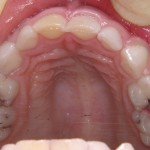
Worldwide dental caries remains one of the most prevalent chronic diseases of childhood. Sadly, in many countries a significant proportion of this decay remains untreated leading to pain, sepsis and occasionally more severe complications. Studies have shown associations between caries and poor growth, low weight gain, missed school and poorer performance. The aim of this study was to assess the impact of dental treatment of severe dental caries on children’s weight, height and subjective health related outcomes, namely dental pain, satisfaction with teeth and smile, dental sepsis and child’s appetite.
86 children aged 72-95 months with severe caries (having at lease two teeth with pulpal involvement). Children in need of urgent treatment those with illnesses affecting growth those on nutritional supplements of with anaemia were excluded.
Children were randomised to early (test, n=42) or regular treatment (control, n=44). Treatment consisted of extraction of grossly decayed teeth, stainless steel crowns for extensive decayed teeth and routine dental filings for smaller lesions. Treatment for test children was completed within 2-months. Children in the control group only received treatment for toothache during this period. Children in the control group received their care six-months after the test group. The primary outcome variable was Weight-for-age Z-score (WAZ). Secondary outcomes included Height-for-age Z-score (HAZ), BMI-for-age Z-score (BAZ) [27], dental pain, dental sepsis, satisfaction with teeth and smile and child’s appetite.
- 39 of the test group children (92.8%) received the planned comprehensive dental care
- The mean time interval between baseline and follow-up measures was 34.8 weeks (±1.1). There were no differences between the test and control group
- Test children had non-significant improvements in their mean WAZ, HAZ and BAZ compared to controls (p>0.05). In contrast, WAZ and BAZ of controls were worse than their scores at the baseline, but these differences were not significant.
- Treated children had significantly less pain experience (P = 0.006) (OR 0.09, [0.01-0.51]) and higher satisfaction with teeth (P = 0.001) (OR 9.91, [2.68-36.51]) compared to controls.
- Controls had significantly poorer appetites (P = 0.01) (OR 2.9, [1.24-6.82]) compared to treated children.
- All treated children were free of clinical dental sepsis whereas 20% (9 of 44) of controls who were free of sepsis at baseline had sepsis at follow-up.
The authors concluded
Our findings show that treating severe dental caries in this child population significantly reduced dental pain, dental sepsis, dissatisfaction with teeth and smile and poor appetite. Differences between intervention and control groups in terms of children’s growth were not statistically significant, although they were in the expected direction.
Comment
This interesting community based randomised controlled trial was conducted in Saudi Arabia and had ethical approval which meant the time delay between starting the comprehensive treatment in the control group could only be six months. Some may argue that this this is too long although some delay is necessary to enable differences between the two groups to be seen. As the authors note this is the first such randomised controlled trial of this area and has a very high retention rate, with no exclusions from the analysis and while the study shows a trend towards improvement in the anthropometric measures perhaps as the authors note the study is perhaps underpowered.
Links
Alkarimi HA, Watt RG, Pikhart H, Jawadi AH, Sheiham A, Tsakos G. Impact of treating dental caries on schoolchildren’s anthropometric, dental, satisfaction and appetite outcomes: a randomized controlled trial. BMC Public Health. 2012 Aug 29;12:706. doi: 10.1186/1471-2458-12-706. PubMed PMID: 22928903; PubMed Central PMCID: PMC3497873.
